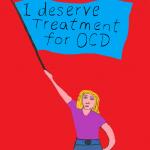Telling friends about OCD
July 20th 2015
About the author: Rachel is sixteen years old and has just finished GCSEs. She lives in London and has had OCD for about 2 years.
Telling friends about your OCD can be quite scary or intimidating. Especially as most people don’t know what OCD is, it can be difficult for people to understand, but hopefully this post will help you to think of how to explain your OCD to friends.
This is just a list of ideas and tips- it is by no means a rule book or script.
- It’s important to choose the right place and time to tell your friends, especially if you are telling them face to face. Preferably choose a quiet, calm moment when you have enough time to explain and answer any questions your friends may have. Also, make sure you are not within earshot of people you don’t want to hear you.
- Explain what OCD is in general terms i.e. explain that “an obsession is an unwanted or unpleasant thought, image or urge that repeatedly enters a person’s mind, causing feelings of anxiety, disgust or unease” (NHS), and “a compulsion is a repetitive behaviour or mental act that someone feels they need to carry out to try to temporarily relieve the unpleasant feelings brought on by the obsessive thought (NHS). You can also explain that although most people have occasional intrusive thoughts and sometimes perform actions like washing hands twice, or not wanting to say words associated with death etc., it is not considered OCD unless is causes significant distress and/or takes up a lot of time.
- Once the person you are telling understands that OCD is not just, for example, neatness, you can explain how OCD affects you, although it may be difficult, and it isn’t necessary to tell a friend what obsessions you have. It may also be helpful to explain if you have avoided things you previously didn’t, due to OCD. Also, if your compulsions are not visible, or you hide your OCD, maybe tell your friends this in case they feel bad for not noticing.
- It might be helpful to tell your friends what they can do to help. For example, you can tell them what your current compulsions are, so that they can point out to you if you begin to do more compulsions, or more frequently etc.
- Finally, your friends will probably have some questions so, if you feel comfortable to do so, maybe offer to answer any questions they have.
It is ok to tell as many or as few people as you like, as well as telling friends however you like e.g. face to face, texting etc.
Also, your friends may all respond or react differently. For example, some friends I told were interested in applying what they had learned in psychology to what I was telling them, some friends said that they hadn’t previously known that OCD wasn’t just extreme handwashing, but would now find out more, and other friends were then able to tell me about things they didn’t think anyone would relate to regarding mental health.
To sum up, a good way to tell your friends about your OCD would be to choose the right place and right time (as with any serious conversation), explain OCD in general and how it affects you, suggest ways they can help you, and then offer to answer any questions.
By Rachel, 16,







